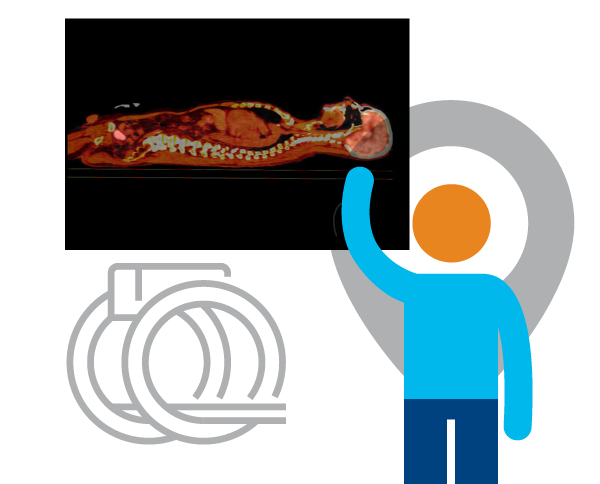A Simple Guide to
PET Scans
Preparing for a PET scan and curious about the journey ahead?
This simplified guide will provide a clear understanding of what to expect during your PET scan appointment.
Table of Contents
Image credit: Sunshine Coast Radiology

What's a PET Scan?
A PET scan, short for Positron Emission Tomography, is a specialised medical test that uses a small amount of safe radioactive material to create images of the inside of your body.

Before the Scan
When you arrive for your PET scan, the friendly healthcare team will assist you.
You might need to avoid eating or drinking for a few hours before the scan, depending on the specific instructions.
They’ll ensure you’re comfortable and prepared for the procedure.
- You might need to avoid eating or drinking for a few hours before the scan, depending on the specific instructions. They'll ensure you're comfortable and prepared for the procedure.
- Most patients will have an additional, diagnostic CT scan scheduled immediately after the PET/CT scan. This is done immediately on the same scanner.
- The duration of both procedures, including preparation time is approximately 1.5 to 2.5 hours.

During the Scan
You’ll lie down on a comfy table that moves into a large machine.
A small amount of radioactive material will be injected into your body, which is then detected by the camera as it scans.
- Don't worry, it's safe and the radiation is minimal.
- The technologist will prepare and inject the tracer into an arm vein.
- You will then rest alone for 45-60 minutes while the tracer distributes through the body.
- During this period, you will be asked to avoid frequent muscle activity and reading.
Ensuring Your Comfort
Staying Calm and Still
Ensuring Your Comfort
Got questions or concerns?
Be sure to share them with the healthcare team before the scan. They want you to be as relaxed as possible.
You might be offered headphones to listen to music during the scan to help you feel more at ease.
Staying Calm and Still
While the scan is happening, it’s important to lie still. This helps create clear images that doctors can use to understand what’s happening inside you.
It takes around 15-25 minutes to complete the images.
You can breathe normally but must not move during this time. The technologist will guide you and let you know how long each scan will take.

After the Scan
Once the PET scan is complete, you can get back to your regular activities. There’s no need for any special recovery time.
The radioactive material will leave your body naturally. If you are caring for a small child, or breastfeeding, we may ask you to take some minor precautions.
This will be explained to you by the staff.

Results and Next Steps
A doctor will review the PET scan images and share the findings with you.
They’ll explain what they see and discuss any further steps or treatments that may be needed.

Patient Safety
PET/CT procedures are very safe and there have been no reported adverse reactions.
Exposure to low doses of gamma radiation carries an extremely small theoretical radiation exposure risk. However, radiation exposure effects are cumulative in nature.
The contrast media administered for the diagnostic CT scan proceeding the PET scan is an iodine-based contrast. CT contrast is generally safe. Adverse reactions can occur ranging from minor to severe. However, severe reactions are extremely uncommon.
In Summary
Mammography is a simple and important test to keep your breast health in check.

- Remember to communicate any concerns you have with the healthcare team
- Don't hesitate to ask questions
- Your comfort and health are their top priorities.
Disclaimer: Please note, if you have any questions or reservations about an upcoming radiology scan, it is always recommended to consult with your healthcare provider, who can address your concerns directly. This is general information, not tailored to a specific individual. Please read our Terms and Conditions.
